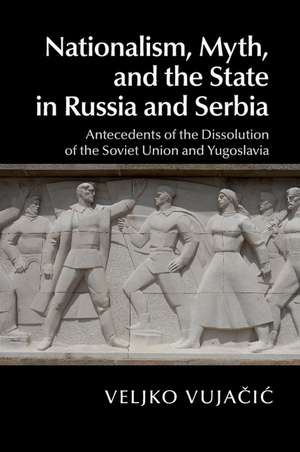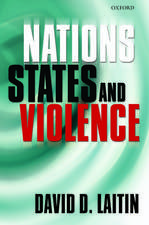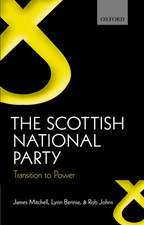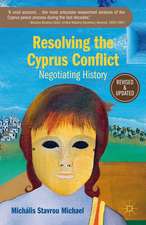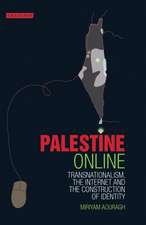Nationalism, Myth, and the State in Russia and Serbia: Antecedents of the Dissolution of the Soviet Union and Yugoslavia
Autor Veljko Vujačićen Limba Engleză Paperback – 31 mai 2017
| Toate formatele și edițiile | Preț | Express |
|---|---|---|
| Paperback (1) | 289.57 lei 6-8 săpt. | |
| Cambridge University Press – 31 mai 2017 | 289.57 lei 6-8 săpt. | |
| Hardback (1) | 699.52 lei 6-8 săpt. | |
| Cambridge University Press – 25 mar 2015 | 699.52 lei 6-8 săpt. |
Preț: 289.57 lei
Nou
Puncte Express: 434
Preț estimativ în valută:
55.42€ • 57.25$ • 46.12£
55.42€ • 57.25$ • 46.12£
Carte tipărită la comandă
Livrare economică 26 martie-09 aprilie
Preluare comenzi: 021 569.72.76
Specificații
ISBN-13: 9781107424074
ISBN-10: 1107424070
Pagini: 335
Ilustrații: 3 tables
Dimensiuni: 153 x 230 x 20 mm
Greutate: 0.49 kg
Editura: Cambridge University Press
Colecția Cambridge University Press
Locul publicării:New York, United States
ISBN-10: 1107424070
Pagini: 335
Ilustrații: 3 tables
Dimensiuni: 153 x 230 x 20 mm
Greutate: 0.49 kg
Editura: Cambridge University Press
Colecția Cambridge University Press
Locul publicării:New York, United States
Cuprins
Introduction; 1. Russians and Serbs in the dissolution of the Soviet Union and Yugoslavia: grounds for comparison and alternative explanations; 2. States, nations, and nationalism: a Weberian view; 3. Empire, state, and nation in Russia and Serbia; 4. Communism and nationalism: Russians and Serbs in the Soviet Union and Yugoslavia; 5. The nation as a community of shared memories and common political destiny: Russians and Serbs in literary narratives; Conclusion; Postscript.
Recenzii
'In this much-needed study, Veljko Vujačić takes the reader on a fascinating journey through the comparative history of Serbia and Russia for the purpose of understanding the violent collapse of Yugoslavia in the early 1990s as counterposed to the relatively peaceful dissolution of the Soviet Union. Along the way, he explores the theoretical contributions of Max Weber and other historical sociologists to understanding nationalism and its reliance on mythopoetic historical memory. An intriguing postscript about the Russian annexation of Crimea concludes this altogether highly illuminating and carefully argued book.' Norman Naimark, Stanford University, California
'Veljko Vujačić's deeply learned and lucidly argued study of the long-term legacies of nation- and state-formation in Russia and Serbia is a model of Weberian comparative historical sociology.' Rogers Brubaker, University of California, Los Angeles
'Totally contrary to the leader-focused explanation common in the early 1990s of why the Soviet Union disintegrated peacefully and Yugoslavia did not - Yeltsin versus Milosevic - this fascinating, richly documented, and utterly creative use of this paradox insists instead on the role of collective historical memory. It is a must-read for any student of nationalism, of the politics of state disintegration, and of secessionist movements anywhere, including those interested in the continuing conflicts with Kosovo and Ukraine.' Susan L. Woodward, Graduate Center, City University of New York
'This is a complex volume that will engage the reader on multiple levels: from controversial theoretical and methodological frameworks, to historical interpretations and assessments, to evaluations of literary works. … One thing is certain, this volume will leave no one indifferent.' Gordanza Uzelac, Slavic Review
'Veljko Vujačić's deeply learned and lucidly argued study of the long-term legacies of nation- and state-formation in Russia and Serbia is a model of Weberian comparative historical sociology.' Rogers Brubaker, University of California, Los Angeles
'Totally contrary to the leader-focused explanation common in the early 1990s of why the Soviet Union disintegrated peacefully and Yugoslavia did not - Yeltsin versus Milosevic - this fascinating, richly documented, and utterly creative use of this paradox insists instead on the role of collective historical memory. It is a must-read for any student of nationalism, of the politics of state disintegration, and of secessionist movements anywhere, including those interested in the continuing conflicts with Kosovo and Ukraine.' Susan L. Woodward, Graduate Center, City University of New York
'This is a complex volume that will engage the reader on multiple levels: from controversial theoretical and methodological frameworks, to historical interpretations and assessments, to evaluations of literary works. … One thing is certain, this volume will leave no one indifferent.' Gordanza Uzelac, Slavic Review
Notă biografică
Descriere
This book examines the role of Russian and Serbian nationalism in dissolution of the Soviet Union and Yugoslavia in 1991.
